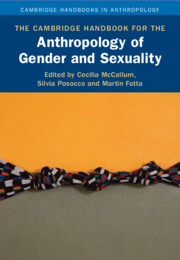Book contents
- The Cambridge Handbook for the Anthropology of Gender and Sexuality
- Cambridge Handbooks in Anthropology
- The Cambridge Handbook for the Anthropology of Gender and Sexuality
- Copyright page
- Contents
- Contributors
- 1 Introduction to The Cambridge Handbook for the Anthropology of Gender and Sexuality
- Part One Openings and Orientations
- 2 Remixing Feminist Epistemology and Methodology
- 3 Critical Ethnography as a Collective Feminist Project
- 4 Kinship and Relatedness as Vital Lens
- 5 Reframing the Social, Rethinking the Body, Confronting Biologism
- Part Two Knowledges and Domains
- Part Three Resistances and Intersections
- Part Four Desires and Relations
- Part Five Recursivities and Futures
- Name Index
- Subject Index
- References
5 - Reframing the Social, Rethinking the Body, Confronting Biologism
from Part One - Openings and Orientations
Published online by Cambridge University Press: 29 September 2023
- The Cambridge Handbook for the Anthropology of Gender and Sexuality
- Cambridge Handbooks in Anthropology
- The Cambridge Handbook for the Anthropology of Gender and Sexuality
- Copyright page
- Contents
- Contributors
- 1 Introduction to The Cambridge Handbook for the Anthropology of Gender and Sexuality
- Part One Openings and Orientations
- 2 Remixing Feminist Epistemology and Methodology
- 3 Critical Ethnography as a Collective Feminist Project
- 4 Kinship and Relatedness as Vital Lens
- 5 Reframing the Social, Rethinking the Body, Confronting Biologism
- Part Two Knowledges and Domains
- Part Three Resistances and Intersections
- Part Four Desires and Relations
- Part Five Recursivities and Futures
- Name Index
- Subject Index
- References
Summary
This chapter introduces approaches to materiality and biology within anthropological scholarship on sex and gender. It emphasizes how biological subfield of eco-evo-devo (which emerged in dialogue with feminist studies) can contribute to anthropological debates. The authors focus on hormones, signaling molecules that regulate many physiological processes in humans, animals, and plants. Hormones are a particularly productive site for considering how anthropologists interested in sex, gender, and bodies might benefit from additional attention to biological processes and biological knowledges, as they challenge prevailing concepts and categorical oppositions of self/world, nature/culture, and mind/matter. The authors first sketch out a history of the relationship between anthropology and biology and, within that history, how feminists have confronted biologism. They then introduce eco-evo-devo and explore how its insights about hormones and development can serve as a prompt to rethink the body within anthropology. Last, they review examples of social scientific engagement with hormones, arguing that a deeper engagement with the materiality of hormones rather than only with their popular representation can help anthropologists continue their ongoing efforts to reframe the social and apprehend gender and sexuality as entangled within complex ecologies of industrial capitalism.
Keywords
- Type
- Chapter
- Information
- Publisher: Cambridge University PressPrint publication year: 2023

